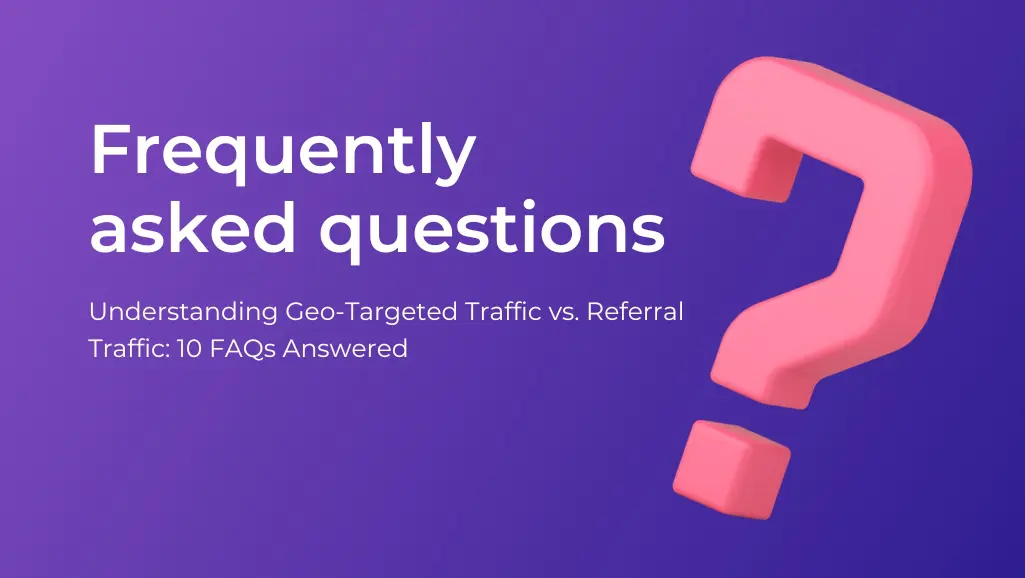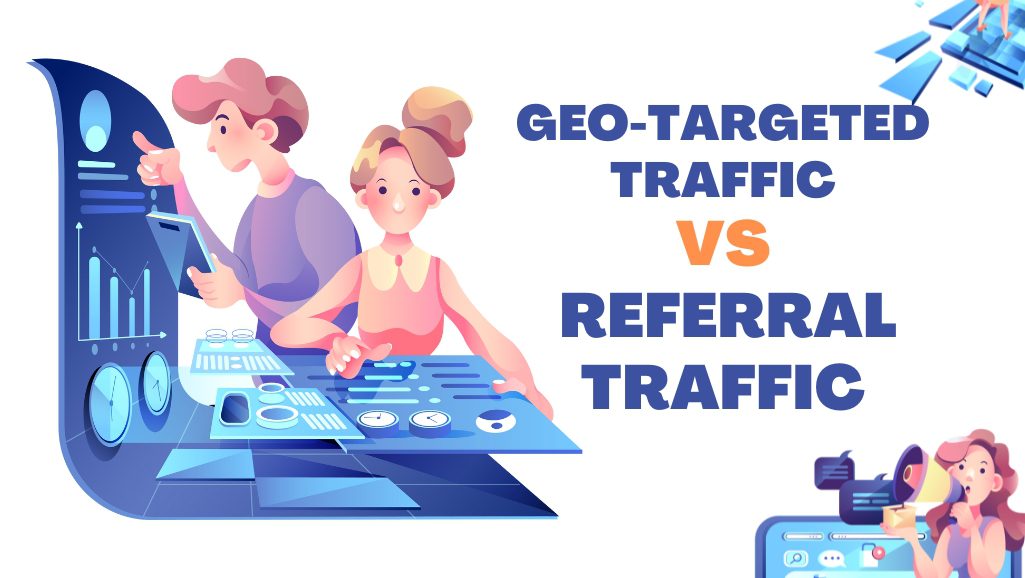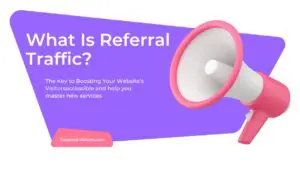In today’s digital world, attracting website visitors who are genuinely interested in your offerings is crucial for success. For local businesses, this means capturing the attention of potential customers within your specific service area. Here’s a breakdown of two powerful strategies to achieve this: and geo-targeted traffic & referral traffic.
Contents
- 1 Understanding Geo-Targeted Traffic:
- 2 Harnessing the Power of Geo-Targeted Traffic:
- 3 Deep Dive into Geo-Targeted Traffic: Maximizing Local Reach and Engagement
- 4 Geo-Targeted Traffic (Local Traffic)
- 5 Importance of Geo-Targeted Traffic
- 6 Understanding Referral Traffic: A Local Business’s Secret Weapon
- 7 What is Referral Traffic?
- 8 Why is Referral Traffic So Valuable for Local Businesses?
- 9 How to Generate Powerful Referrals:
- 10 The Synergy of Geo-Targeting and Referral Traffic:
- 10.1 What Is the Primary Difference Between Geo-Targeted Traffic And Referral Traffic?
- 10.2 How Does Geo-Targeted Traffic Benefit Local Businesses Compared To Referral Traffic?
- 10.3 Can Businesses Target Specific Cities Or Regions With Geo-Targeted Traffic?
- 10.4 What Are Some Common Sources Of Referral Traffic?
- 10.5 How Can Businesses Increase Their Geo-Targeted Traffic Through Local SEO Strategies?
- 10.6 Is Referral Traffic More Effective For Brand Awareness Or Lead Generation?
- 10.7 What Role Do Backlinks Play In Driving Referral Traffic To A Website?
- 10.8 Can Businesses Track And Analyze The Performance Of Both Geo-Targeted And Referral Traffic?
- 10.9 How Can Businesses Optimize Their Website Content To Attract More Geo-Targeted Traffic?
- 10.10 Is It Possible To Combine Geo-Targeted Traffic And Referral Traffic In A Comprehensive Marketing Strategy?
Understanding Geo-Targeted Traffic:
Geo-targeted traffic refers to website visitors whose location data (IP address or GPS) is used to display targeted ads and marketing messages. Imagine owning a cozy pizzeria famous for its deep-dish delights. Wouldn’t it be amazing to target online advertisements for your delicious pizzas only to users within a few miles radius who might be craving a takeaway dinner? That’s the magic of geo-targeting!
Benefits of Geo-Targeted Traffic:
- Enhanced Relevance: Deliver highly relevant ads that resonate with users based on their location. This means showcasing winter gear only to users in snowy regions or promoting beach accessories to those basking in coastal areas. Geo-targeting ensures your message is timely and impactful, leading to increased engagement.
- Improved Targeting Precision: Reach the right audience with laser focus. Target users within specific cities, zip codes, or even a radius around your physical location. This eliminates wasted ad spend on irrelevant demographics, maximizing the impact of your campaign.
- Boosted Conversions and Sales: By reaching users actively searching for solutions near them, geo-targeting increases the likelihood of conversions and sales. It’s the digital equivalent of having a storefront on a busy street corner – you’re capturing the attention of people who are most likely to walk in.
- Gain a Competitive Edge: Stand out from the crowd! Geo-targeting allows you to target specific local areas, potentially reaching customers who might visit a competitor. Highlight your unique selling points and entice them to switch!
- Unlock Real-Time Engagement: Run dynamic, location-specific campaigns that capitalize on real-time opportunities. Promote special offers to attendees at a nearby conference, advertise rain gear before a sudden downpour, or offer discounts for local restaurants after a movie ends. Geo-targeting allows you to be present at the exact moment your target audience needs you.
Harnessing the Power of Geo-Targeted Traffic:
Geo-targeting capabilities are readily available on various advertising platforms, making it easier than ever to get started:
- Social Media Advertising: Platforms like Facebook Ads, Instagram Ads, and Twitter Ads allow you to target users based on their current location, hometown, or recent location history.
- Search Engine Marketing (SEM): Leverage platforms like Google Ads to target users in specific countries, regions, cities, or even postal codes. You can even include radius targeting to reach users within a set distance of your business location.
Deep Dive into Geo-Targeted Traffic: Maximizing Local Reach and Engagement
Geo-targeted traffic, also known as local traffic, plays a crucial role in digital marketing strategies, especially for businesses with specific regional or local target audiences. Let’s delve deeper into the concept of geo-targeted traffic and explore how businesses can maximize its potential for local reach and engagement.
Geo-Targeted Traffic (Local Traffic)
Geo-targeted traffic refers to visitors who are specifically targeted based on their geographic location. This type of traffic is highly relevant for businesses that operate locally or have specific target markets in certain regions. Here are some key points to buy geo-targeted traffic:
- Targeted Location: Geo-targeted traffic focuses on attracting visitors from specific geographic areas such as cities, regions, or countries. This targeting is achieved through various digital marketing tactics, including local SEO, location-based advertising, and geo-targeting settings in online campaigns.
- Relevance: Geo-targeted traffic is highly relevant to businesses serving local or regional markets. It ensures that website visitors are from areas where the business operates or targets its products or services, increasing the chances of conversion and customer engagement.
- Local SEO: Optimizing for local search is a crucial aspect of attracting geo-targeted traffic. This includes optimizing Google My Business listings, using location-based keywords, and acquiring local backlinks to improve visibility in local search results.
- Benefits: The benefits of geo-targeted traffic include higher conversion rates, improved customer engagement, better targeting of marketing efforts, and increased visibility in local search results.
Importance of Geo-Targeted Traffic
- Relevance: Geo-targeted traffic ensures that website visitors are from areas where the business operates or targets its products or services. This increases the relevance of the traffic and enhances the chances of conversion and customer engagement.
- Higher Conversion Rates: Visitors from the local area are more likely to convert into leads or customers compared to visitors from other locations. They are often seeking local solutions and are more inclined to take action.
- Improved User Experience: Geo-targeted content and offers provide a personalized user experience, addressing the specific needs and preferences of the local audience.
- Competitive Advantage: Targeting local markets effectively can give businesses a competitive edge, especially in industries where local presence and trust are crucial.
Strategies for Maximizing Geo-Targeted Traffic
- Local Keyword Optimization: Use location-specific keywords in website content, meta tags, headings, and image alt text to improve local search visibility.
- Localized Landing Pages: Create dedicated landing pages for different geographic areas, optimizing them with relevant content and calls-to-action.
- Google My Business Optimization: Claim and optimize your Google My Business listing with accurate business information, photos, reviews, and updates.
- Localized Content Marketing: Develop content that speaks to local interests, events, and news. Incorporate local testimonials, case studies, and success stories.
- Geo-Targeted Advertising: Utilize geo-targeting options in digital advertising platforms to reach audiences in specific locations with targeted ads and promotions.
- Engage with Local Communities: Participate in local events, sponsorships, partnerships, and collaborations to increase brand visibility and community engagement.
Monitoring and Analyzing Geo-Targeted Traffic
It’s essential to monitor and analyze the performance of geo-targeted traffic to optimize strategies and achieve desired outcomes. Key metrics to track include:
- Geographic Data: Analyze website analytics to understand where your geo-targeted traffic is coming from, which locations are performing well, and where improvements can be made.
- Conversion Rates: Measure the conversion rates of geo-targeted traffic compared to overall traffic to assess the effectiveness of local targeting efforts.
- User Behavior: Evaluate user behavior metrics such as time on site, bounce rates, and page views to gauge the engagement levels of geo-targeted visitors.
- ROI on Local Campaigns: Calculate the return on investment (ROI) of local marketing campaigns and initiatives to determine their impact on generating leads and sales from targeted geographic areas.
Understanding the Differences
- Targeting: Geo-targeted traffic focuses on specific geographic locations, while referral traffic comes from various external sources.
- Relevance: Geo-targeted traffic is highly relevant to local businesses, whereas referral traffic can be targeted based on the source’s alignment with the target audience.
- Source: Geo-targeted traffic originates from location-based targeting strategies, while referral traffic originates from external websites or platforms.
- Conversion: Geo-targeted traffic often leads to higher conversion rates due to its relevance, while referral traffic can also result in conversions if the source is highly relevant and authoritative.
Benefits of Both Traffic Types
- Geo-Targeted Traffic Benefits: Improved local visibility, higher conversion rates, enhanced customer engagement, and better ROI on marketing efforts.
- Referral Traffic Benefits: Diversified traffic sources, potential for partnerships/collaborations, improved SEO through backlinks, and increased brand awareness.
Understanding Referral Traffic: A Local Business’s Secret Weapon
While geo-targeted traffic excels at attracting potential customers within your specific service area, referral traffic offers a different kind of magic. It taps into the power of word-of-mouth marketing, a local business’s most valuable asset.
What is Referral Traffic?
Referral traffic refers to visitors who arrive at your website by clicking a link from another website, excluding search engines and direct visits. Imagine a local blogger raving about your bakery’s delectable pastries and including a link to your website. Readers who click that link and visit your site are considered referral traffic.
Why is Referral Traffic So Valuable for Local Businesses?
- Unmatched Trust: People are far more likely to trust recommendations from friends, family, or colleagues than traditional advertising. Referrals come from respected sources, carrying a level of authenticity that paid promotions simply can’t replicate.
- Qualified Leads: Imagine this: a local food critic writes a glowing review about your restaurant’s signature dish. Diners who read the review are more likely to be interested in your cuisine, leading to higher conversion rates and a more loyal customer base.
- Boosted Brand Reputation: Positive word-of-mouth recommendations spread organically, building trust and credibility for your brand. Referrals serve as social proof, validating your delicious food and attracting new customers who see the value your restaurant provides.
- Cost-Effective Acquisition: Compared to traditional marketing methods, referrals come at a minimal cost. You’re not paying for ad space, clicks, or impressions – you’re leveraging the power of your existing satisfied customers to spread the word.
How to Generate Powerful Referrals:
Building a strong referral program is an ongoing process, but the rewards are substantial. Here are some actionable strategies to encourage your customers to become brand advocates:
- Deliver an Exceptional Customer Experience: The foundation of a successful referral program lies in providing outstanding service and high-quality products. Happy customers are more likely to recommend your business to others.
- Implement a Referral Program: Formalize your program, offering incentives like discounts, rewards points, or free products for both the referrer and the referred customer.
- Make it Easy to Share: Integrate social media sharing buttons and unique referral links on your website, marketing materials, and even business cards. Encourage customer reviews on platforms like Google My Business or Yelp. The easier it is for customers to spread the word, the more effective your program will be.
- Show Appreciation: Publicly acknowledge and thank your referrers. Social media shoutouts, personalized emails, or exclusive discounts show that you value their efforts and incentivize them to continue spreading the word.
The Synergy of Geo-Targeting and Referral Traffic:
Geo-targeted traffic helps you reach potential customers within your local area, while referral traffic leverages the power of existing customer satisfaction. By combining these strategies, you can create a powerful marketing force that attracts new customers who are genuinely interested in your local business.
Remember: Building a thriving referral program takes time and effort. By prioritizing customer satisfaction, creating a clear incentive structure, and making it easy for customers to advocate for your brand, you’ll cultivate a loyal community of brand ambassadors who drive organic growth and propel your local business forward. Geo-targeted traffic is a valuable asset for businesses looking to maximize their local reach, engage with their target audience effectively, and drive conversions. By implementing targeted strategies, optimizing local content, and analyzing performance metrics, businesses can harness the power of geo-targeted traffic to achieve their marketing goals and grow their presence in specific geographic markets.

What Is the Primary Difference Between Geo-Targeted Traffic And Referral Traffic?
- Answer: Geo-targeted traffic is targeted based on geographic location, while referral traffic comes from external sources like other websites or social media.
How Does Geo-Targeted Traffic Benefit Local Businesses Compared To Referral Traffic?
- Answer: Geo-targeted traffic is highly relevant to local businesses as it targets audiences in specific geographic areas where the business operates, leading to higher conversion rates.
Can Businesses Target Specific Cities Or Regions With Geo-Targeted Traffic?
- Answer: Yes, businesses can target specific cities, regions, or countries with geo-targeted traffic to reach their desired audience.
What Are Some Common Sources Of Referral Traffic?
- Answer: Common sources of referral traffic include social media platforms, guest posts, backlinks from other websites, online forums, and directories.
How Can Businesses Increase Their Geo-Targeted Traffic Through Local SEO Strategies?
- Answer: Businesses can increase geo-targeted traffic by optimizing their website with local keywords, creating location-based content, and improving their Google My Business listing.
Is Referral Traffic More Effective For Brand Awareness Or Lead Generation?
- Answer: Referral traffic can be effective for both brand awareness and lead generation, depending on the quality and relevance of the referral sources.
What Role Do Backlinks Play In Driving Referral Traffic To A Website?
- Answer: Backlinks from reputable and relevant websites can drive referral traffic, improve SEO authority, and increase website visibility.
Can Businesses Track And Analyze The Performance Of Both Geo-Targeted And Referral Traffic?
- Answer: Yes, businesses can use analytics tools to track key metrics such as traffic sources, conversions, bounce rates, and engagement levels for both types of traffic.
How Can Businesses Optimize Their Website Content To Attract More Geo-Targeted Traffic?
- Answer: Businesses can optimize their content with local keywords, create location-specific landing pages, and tailor their offerings to meet the needs of local audiences.
Is It Possible To Combine Geo-Targeted Traffic And Referral Traffic In A Comprehensive Marketing Strategy?
- Answer: Yes, businesses can combine geo-targeted traffic and referral traffic to create a comprehensive marketing strategy that targets specific locations and leverages diverse Targeted Website traffic sources for increased visibility and conversions.






